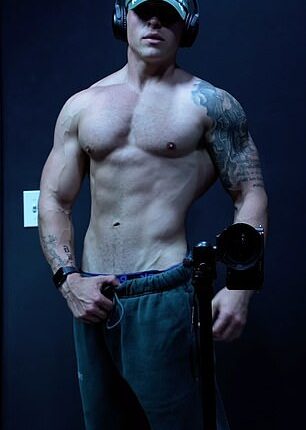The US military uniform has long been a symbol of unity and discipline, designed to strip away individuality and emphasize the collective mission. Yet in 2025, a new breed of service member is challenging that tradition: the military influencer.
‘A lot of people feel that you have to be like GI Joe or like Captain America to join the military – and it’s just not the case,’ said Austin Von Letkemann, a military influencer and army captain going on 15 years of service.
From TikTok skits to Instagram reels, these men and women are blending service with social media, building massive followings and even generating income—all while navigating the ‘gray area’ of Pentagon ethics rules.
Some have been criticized for posting inappropriate or even ‘sexualized’ content, earning hundreds of thousands of dollars.
One of the more well–known influencers in this arena is self proclaimed ‘Army Psyop’ Hayley Lujan –– with over a million followers on TikTok.
As of late, Lujan posted a picture in a tight black dresses with soldiers on her arms with blurred out faces, with the caption, ‘to freedom and friends and free booze.’
Another more scandalous post shows her in a skimpy Ronald McDonald outfit holding a gun, asking her followers to purchase her outfit with a ‘link in her bio.’
There are threads on reddit questioning why she hasn’t been disciplined yet over her ‘wild posts.’


Some have been criticized for posting inappropriate or even ‘sexualized’ content, earning hundreds of thousands of dollars

Lujan posted a picture in a tight black dresses with soldiers on her arms with blurred out faces, with the caption, ‘to freedom and friends and free booze’
Rylee Roast, a US Air Force Medic, boast over 100,000 followers on Instagram –– posting photo–shoots with her uniform and also, tight spandex outfits embracing her curves, with hashtags like ‘military medic’ and ‘women in uniform.’
‘Women are automatically at a disadvantage in the military because they are just kind of put in boxes and labeled very quickly,’ Johnny Vargas, a military influencer told Daily Mail.
But he warns that some are ‘pushing the envelope’ and that they should ‘try to limit what they post to be safe.’
It’s not just women though — male service members have also found fame online, often showing off their physiques in tight uniforms or shirtless gym videos that blur the line between fitness inspiration and ‘thirst traps.’
People like Christopher Sparks and Dominic Wakeham, a United States Marine Corps veteran –– posting shirtless videos with blaring heavy metal music in the background, flexing, even showing off underwear, leaving little to the imagination.
Insiders close to some of these influencers say the Pentagon is not impressed with their social media flaunting. The Defense Department did not respond to the Daily Mail’s request for comment.
Wakeham spoke to Daily Mail saying a lot of the negativity is coming from the ‘old heads’ in the military.
‘Do I have haters? I mean, I’m sure there are a few out there, but there’s never been any with the nuts to say something to my face? Nah? No but all seriousness I’m sure there are people out there who don’t like what I do within the military with my platform, but I think it’s always important to remember that an individual who is negatively dealing another individual without knowing them is wrong for judging another person,’ Wakeham told Daily Mail.
Vargas describes many influencers he knows as working for an honorable cause –– actually helping the military’s brand.
He said when he started posting online it began as a ‘silly hobby’ two years ago.

People like Dominic Wakeham, a United States Marine Corps veteran –– post shirtless videos with blaring heavy metal music in the background, flexing, even showing off underwear, leaving little to the imagination

Rylee Roast, a US Air Force Medic, boast over 100,000 followers on Instagram

Roast posts photo–shoots with her uniform and also, tight spandex outfits embracing her curves, with hashtags like ‘military medic’ and ‘women in uniform’

Roast posts a photo on instagram, captioning it ‘Another San Diego Photo Dump’
‘I did a skit and people started watching. Then I started talking about veterans, service members and families’ benefits… and it just exploded,’ Vargas said.
Now he’s working with scores of non-profit organizations, as well as companies where he does lucrative consulting work and brand deals.
‘It’s been a huge financial and professional blessing to me and my family,’ Vargas added.
A junior enlisted service member might take home the equivalent of $35,000–$60,000 per year, factoring in things like allowances and benefits — even though their base pay is much lower. An influencer with over 500,000 followers could make $5,000 to $10,000 per post if they attain things like sponsorships or brand deals.
‘They pay more than what the military pays me as a senior enlisted married soldier,’ Vargas told Daily Mail.
Some influencers we spoke with tell the Daily Mail they make up to half a million a year.
When asked what they think of the title ‘influencer’, every service member Daily Mail spoke with expressed distaste.
‘It’s kind of a cuss word,’ Vargas said. ‘It gives us a nasty tone.’ He prefers to think of himself as more of an educator about what life is like in the military.
Army Captain Austin Von Letkemann, coming up on 15-years of service, who says he’s raked in nearly 120million views on Instagram in the last 30 days alone, agrees.
‘I hate that term. I prefer the term content creator,’ he said, conceding that there are people in the military who look down on this side-hustle.
‘They’re trying to assert that we were chasing clout, chasing fame, chasing monetary gain, whatever it is,’ he remarked.
Letkemann has leveraged his TikTok presence to educate both service members and civilians.
He began posting short, comedic videos, but quickly realized the platform’s power for informing the public about military life, benefits and careers.
‘I think people relate to my videos. It’s the empathy factor,’ Letkemann told Daily Mail.
Letkemann is a part of the army’s now–paused ‘Creative Reserve’ pilot program, which recruited military influencers to help with marketing and publicity. It’s a division he was hoping to head.

Lujan posted in October in a Ronald McDonald sexy outfit holding a gun, asking her followers to purchase her outfit with a ‘link in her bio’. She tagged the official McDonald’s Instagram handle in the post

Dominic Wakeham leaves very little to the imagination as he strips off beside his car

While some inform, others have been criticized for posting inappropriate or even ‘sexualized’ content, earning hundreds of thousands of dollars

From TikTok skits to Instagram reels, these men and women are blending service with social media, building massive followings and even generating income—all while navigating the ‘gray area’ of ethics rules of the Pentagon

For Vargas, the opportunity to reach service members directly is unparalleled. ‘I’ve been able to inform service members and their families faster than the DOD does sometimes,’ he says. ‘That’s worth something.’
‘We had a number of content creators. Believe there were eight or nine of us. They flew us out to DC, and we kind of just covered the events. When they crunched the numbers, they were saying that we had provided advertising value in the realm of millions of dollars. That’s an overwhelming success,’ he said.
Letkeman added that the program also hoped to help boost lower recruitment numbers. Something he has already seen happen as a result of his videos.
He said he receives countless messages from people telling him that they ‘chose to join the military based off of the videos.’
‘That’s why I joined the creative reserve program, because I know how much good I can do,’ Letkeman added.
The program was paused due to legal issues over soldiers making financial profit off their videos –– an issue still not revisited.
Matthew Fitzgerald, a former Army lawyer who has written extensively on military ethics, warns that the rules are clear.
‘In simple terms, the DOD’s Joint Ethics Regulation now expressly prohibits monetizing one’s name, image and likeness pertaining to status as a servicemember. Some have called this a ‘gray area,’ but I think the rules, and the intent behind them, are very clear,’ Fitzgerald said.
The legal expert believes there might be confusion because many have ‘violated the rules in plain sight and without any apparent punishment.’
In the end, monetization remains the most contentious point – as questions remain on how much profit is acceptable without crossing ethical lines.
Fitzgerald emphasizes that the rules are explicit: service members cannot profit from their military status. But Vargas, Austin and other content–creators like them argue that partnerships, consulting and educational content allow them to supplement their military careers—and in some cases, plan for post–service life.
‘This social media thing I do now, it’s a full–blown business and now it’s my transition plan as I medically retire from the military,’ Vargas said.
A Pentagon employee and former Air Force veteran who asked to remain anonymous offered a balanced perspective, saying they see both sides of the coin.
‘I think people are hating on military influencers because it’s kind of this ‘shut up and do your job culture,” they told Daily Mail.
‘However, I think a lot of influencers forget how insignificant they are in the grand scheme of ‘the fight.’ Influencers have a reputation for not really being team players,’ they added.
For Vargas, the opportunity to reach service members directly is unparalleled.
‘I’ve been able to inform service members and their families faster than the DOD does sometimes,’ he says.
For Letkemann, the goal is similar: demystifying military life for those considering service, while also creating positive content.
‘I want to make as many people happy, and I want to make as many people laugh as humanly possible. And then after I get out, I want to build a business and a brand as big as I can get it. I want to be successful… I think we deserve that,’ Letkemann said.





![Daniel Craig Unravels a Clue in New Look at Rian Johnson’s 'Wake Up Dead Man' [Exclusive]](https://citigist.com/wp-content/uploads/2025/11/Daniel-Craig-Unravels-a-Clue-in-New-Look-at-Rian-260x140.jpg)


